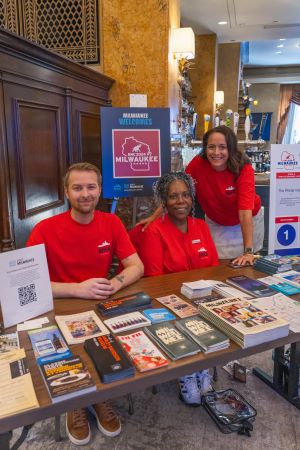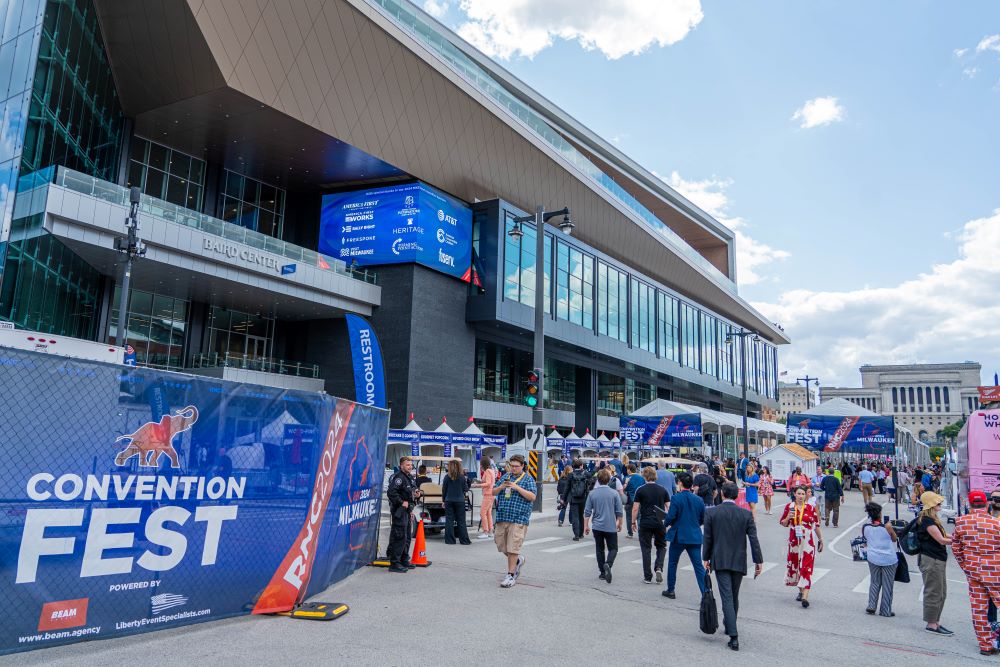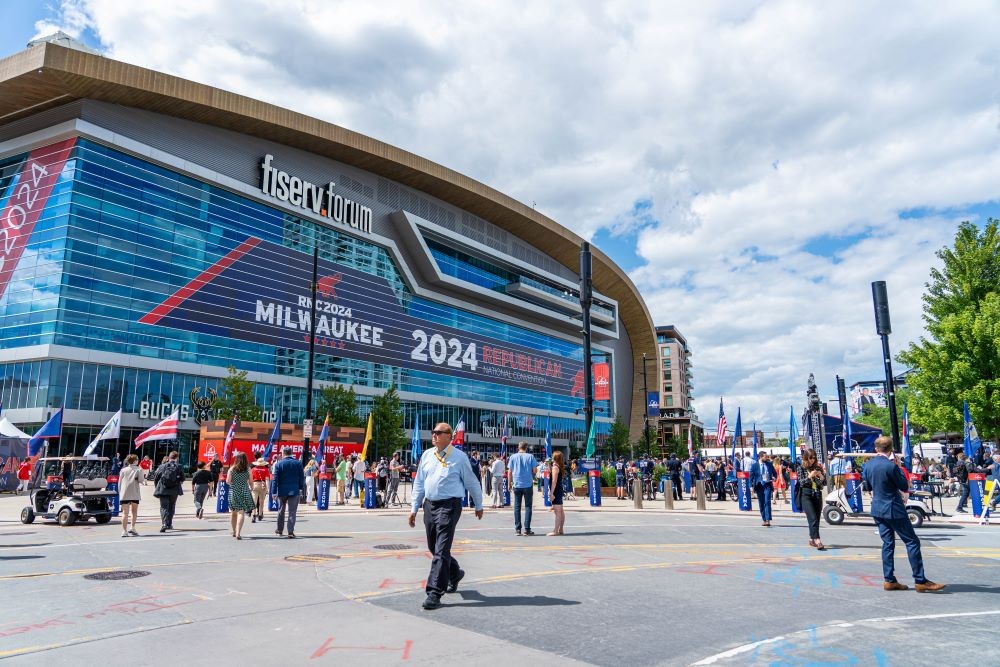Political conventions are undoubtedly very complex citywide events. A coalition of entities needs to come together and communicate effectively in order to put on a successful show, requiring extra layers of planning and coordination. From destination and hotel partners and local and federal government officials to the host committee, the planning team, venue operators and law enforcement—the list of key players goes on.
The 2024 Republican National Convention (RNC) took place July 15-18 in Milwaukee, welcoming an estimated 50,000 people, including delegates, families of delegates, corporate sponsors, interest groups and more, and the total expected economic impact is roughly $200 million (though official numbers will be available this fall, according to Visit Milwaukee).
Such a high-profile event with a profound impact on a destination is an intriguing one to study, from a meeting planner perspective. Fresh off the busyness of the week, Leslie Johnson, vice president of sales and experience for Visit Milwaukee, sat down with Meetings Today to reflect back on the hosting experience and provide some advice to planners when tasked with an event of a similar magnitude.
Lean on Destination Partners When Planning Citywides

Johnson stresses the importance of leaning on destination partners always, but even more so when planning citywide events like the RNC. These partners serve as the community connectors for your many questions and requests—after all, DMOs have a stake in the event, too; it’s an opportunity to put their destination in the spotlight, benefit from an economic boost and attract more high-profile events, so you’ll likely find the team is more than excited to assist.
“I think that's the one thing meeting planners can always take away from this, is how to best work with their DMO and understanding the resources that we have for them and the connections that we can make for them,” she said. “If it's anything within our education system, if it's within 70 of our corporations that are partners of ours. If you want them to be a part of your convention, you want someone to speak on their behalf or you want a tour of their facilities, we are typically going to have those relationships and can make those connections for you.”
DMOs also understand their city best and can make recommendations for transportation flow, which can be a massive lift during conventions like the RNC, or field questions about permitting, venues and more.
“We were definitely a major resource for them. ‘Who do I need to speak with at the city to get this permitting? What venue would be ideal for this event? I need transportation suggestions.’ We were very much that conduit in a number of ways,” Johnson said. “It also helped that our CEO was a part of the host committee. So, she had a voice and had a pulse on what was happening and was able to answer questions if they had issues that came up…Our mayor was very involved, our county executive was very involved. They were very supportive of the convention, too.”
[Related: How to Collaborate With DMOs to Tap Intellectual Capital for Your Next Meeting (And Why You Should)]
Security Considerations and Venue Selection
Whether it’s the RNC or DNC, security and risk assessment is paramount. High-ranking government officials are in attendance, the presence of protesters is on the table and violence is a real possibility in this modern age. Donald Trump, who was officially named the Republican party’s nominee for president at the RNC, survived an assassination attempt just days before the convention began.
It’s all to say that venue selection and understanding the footprint of your event is important for security considerations. In Milwaukee, Johnson pointed to that fact that all of the main venues activated for the convention are condensed in a walkable campus, which made security perimeters easier to set up.
“We're fortunate in the way that our campus is laid out and connected—it was literally one security perimeter,” Johnson explained. “So, once they figured out that hard perimeter, it was only one point of entry that [attendees] had to go through.
“People were just able to bounce back and forth [from venues]…Once they transported [attendees], if they weren't staying in Milwaukee—say they were staying in one of the suburbs and whatnot—then, once they were here, they were good.”
Main venues activated during the RNC included:
- Fiserv Forum, where the main events of the RNC took place.
- Baird Center, the recently expanded convention center where thousands of media members set up shop.
- UW-Milwaukee Panther Arena, which also supported media workspaces.
- Miller High Life Theatre, which supported other RNC events and exhibits.
- “Convention Fest,” a tented area on Kilbourne Avenue where local food vendors and shops gave convention attendees a taste of Wisconsin during event breaks.
All of these venues are essentially in one district square spanning a few city blocks. Such logistics could be more of a challenge for the Democratic National Convention (DNC) in Chicago in August, where venues like McCormick Place and the United Center, for example, are miles apart and will require multiple security and transportation plans.
Equip Destination and Hotel Partners With Detailed Agenda

When thousands of people descend on a destination and split into many hotels in the city and nearby suburbs, ensuring everyone has read the event agenda and “know before you go” documents is a near impossible task (as many meeting planners can attest). And while Visit Milwaukee and the hotel partners for the convention were volunteering, fielding calls about the event and assisting with wayfinding, they weren’t always equipped with the detailed information the attendees needed.
“It’s amazing the number of phone calls that we get from people just with basic questions like, ‘Do you know where this is taking place?’ I think that was another big learning. We really would have really liked to have had a more detailed understanding of all of the events, because those are the questions that the people in the hotel lobbies were getting and that we were getting on our phone,” Johnson explained. “Just making sure that planners are equipping the CVB, the volunteers, the people that are helping with their events, with their full agendas.”
[Related: Touring the Latest and Greatest Meetings Offerings in Madison, Wisconsin Dells and Milwaukee]
Be Ready for Anything
When the content of your convention is so closely tied to current events, or when your keynote speakers are famous figures, you should be prepared for anything. That fact is underscored for political conventions like the RNC.
Just a few days before the convention kicked off, an assassination attempt was made on Donald Trump. Johnson said this caused a wave of calls from attendees—some uncomfortable attending because of security concerns, while another rush of interested parties wanted to come and be part of the historic event.
And while Visit Milwaukee wasn’t directly involved in the security plans, it’s likely there was a lot of discussion happening in those groups, too.
For Johnson and her team, it was all about being flexible and offering any assistance as an event partner that the team required.
“Understanding that those life events are going to take place and the more flexible you are as a partner, the easier it's going to be to take care of the client,” she said. “You might have to make some drastic changes in the immediate future to work with. We were on the phone with them, like, ‘What do you need from us? How can we help? What resources [can we provide]?’ That was obviously uncharted territory for everybody. It's not like, ‘Oh, my speaker got sick or didn’t show up.’
“Just know that these resources are available in every city for planners, if they ever are put in a position where the unexpected does happen.”
Check back in August for learnings from the Democratic National Convention (DNC) in Chicago.
Keep up with all of the latest news in the meetings and events industry.







